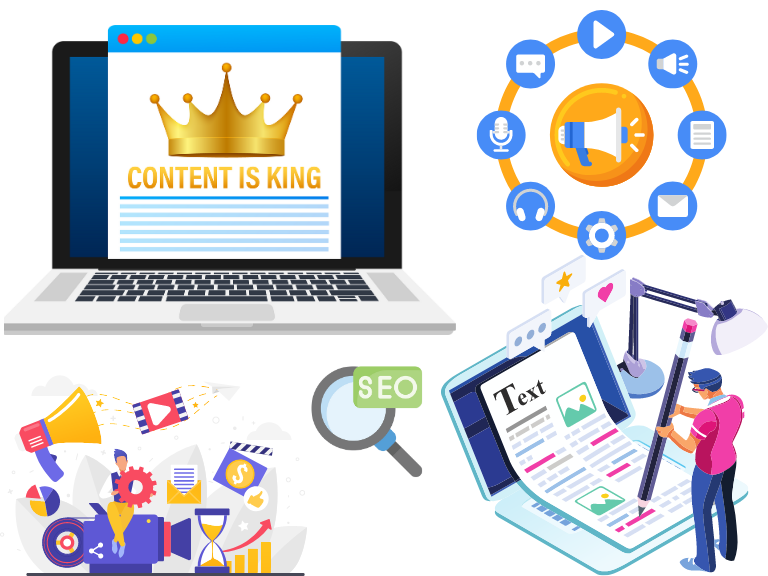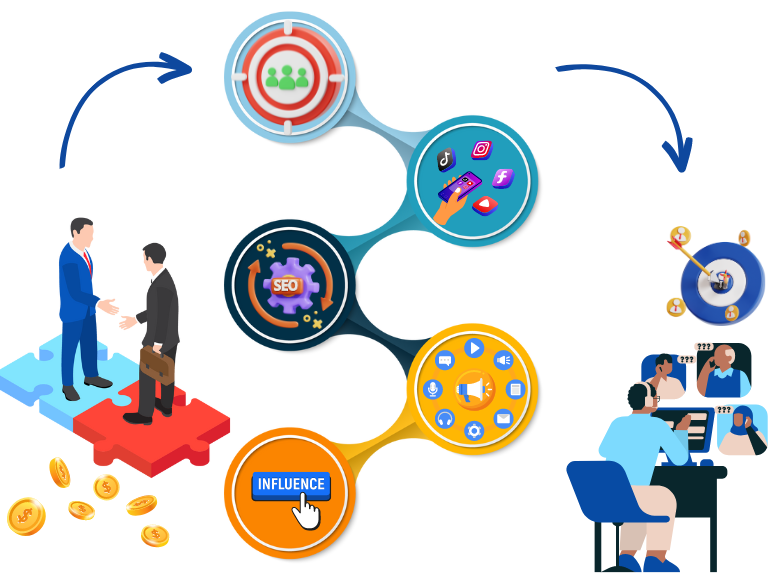Are you feeling stuck, like no matter how hard you try, you can’t find the right leads? You put your heart and soul into your business, you work late nights, you tweak your offers, run social media ads, and post on social media profiles, but it still feels like you’re shouting in the void. Or are you attracting people who are not interested, can’t pay for your services or are not the right fit? If you’re exhausted from chasing the wrong people, you’re not alone. The problem isn’t your offer. It’s not even you. It’s who you’re trying to reach.
The good news? Once you know how to find and connect with the right customers, the ones who need, want, and value what you do, everything starts to feel easier. Conversations flow. Sales feel natural. Growth becomes sustainable.
In this post, we’re going to talk about why finding the right customers is a game-changer and how you can finally shift from struggling to thriving.
1. Understand Your Target Audience

A thorough understanding of your target audience is the foundation of any successful marketing campaign. You can understand your target market by creating detailed buyer personas that represent your ideal customers. These personas should encompass their pain points, challenges, goals, and preferred communication channels. You can conduct surveys, interviews, and data analysis to understand their needs and preferences.
Let’s say you’re a business consultant helping startups scale their operations. One of your target personas could be “Alex, the ambitious startup founder,” seeking expert guidance to overcome growth challenges and optimize processes.
By truly understanding your target audience, you can customize your marketing efforts to resonate with them on a deeper level. This approach leads to more effective campaigns, stronger connections with your customers, and, ultimately, better business outcomes.
2. Utilize Social Media Platforms
Social media has become a necessary tool for B2B marketing. LinkedIn, in particular, offers a treasure of potential customers, as it’s the go-to platform for professionals and businesses. You can share valuable content, participate in relevant groups, and engage with prospects to establish your authority in the industry. By utilizing social media platforms effectively, you can expand your reach, connect with your target audience, and drive meaningful engagement. It’s an essential tool for building brand awareness, establishing thought leadership, and, ultimately, driving B2B lead generation and conversions.
For Example, A B2B consulting firm focuses on helping businesses streamline their supply chains. They actively share industry-specific insights and case studies on LinkedIn, attracting decision-makers looking to improve their logistics processes.
3. Master Search Engine Optimization (SEO)
Optimizing your website for search engines is vital to increase your online visibility. Identify relevant keywords and phrases your potential clients might use to find services or products like yours. Create high-quality content around these keywords, and ensure your website is user-friendly and mobile-responsive.
Example: A business coach focuses on the keyword “leadership development for small businesses” and creates informative blog posts and resources on this topic. By implementing SEO best practices, they rank higher on search engine results pages, drawing in small business owners searching for leadership guidance.
Mastering SEO is crucial for B2B companies to improve online visibility and attract relevant traffic. An attractive website complements SEO efforts by enhancing credibility, showcasing expertise, engaging users, generating leads, and ensuring a positive user experience for B2B customers and clients. Together, these elements contribute to the overall success of your B2B marketing efforts.
4. Content Marketing

Invest in creating valuable and educational content that addresses the pain points of your target audience. Be it blog posts, whitepapers, guides, case studies, videos, or webinars – relevant content positions you as an industry thought leader and builds trust with potential customers. Content marketing is not a one-time campaign but an ongoing strategy. It requires consistency, creativity, and a deep understanding of the target audience. By providing value and building relationships through valuable content, companies can establish themselves as trusted industry leaders and drive long-term business growth.
Example: An industrial equipment manufacturer develops a series of informative videos showcasing how their products boost productivity and ensure safety in various manufacturing processes. These videos are shared across social media platforms and their website, attracting manufacturing companies seeking efficient solutions.
5. Partner with Industry Influencers
Collaborating with influential figures in your industry can significantly expand your reach. Seek partnerships with industry experts, influencers, or complementary businesses. Their involvement and promotion can expose your brand to a wider audience and establish credibility. When partnering with industry influencers, choosing influencers whose values and audience align with your brand is crucial. The collaboration should be mutually beneficial, and the content should feel natural and authentic to ensure a successful and impactful partnership. Overall, working with industry influencers can be a powerful marketing strategy to elevate your brand, increase exposure, and connect with your target audience on a deeper level.
Conclusion
In B2B marketing, understanding and connecting with your target audience is important for success. You can refine your approach and reach your ideal customers by creating detailed buyer personas, utilizing social media platforms, mastering SEO, and investing in valuable content marketing. Collaborating with industry influencers can boost your brand’s visibility and credibility. Remember, B2B marketing is an ongoing journey, and by implementing these strategies, you can pave the way for long-term business growth and meaningful customer relationships.
Looking for expert B2B marketing solutions to supercharge your business growth? End the struggle to find your customers with Exotto’s team of professionals who are ready to help you identify and connect with your ideal customers, driving success in the competitive B2B landscape. Contact Exotto today!
Key Points
- Know your audience: Create detailed buyer personas for targeted B2B success.
- Social media power: Leverage LinkedIn to engage, expand, and excel in B2B marketing.
- SEO for visibility: Optimize and impress with a user-friendly website.
- Influence for impact: Collaborate with industry experts for B2B credibility and growth.

